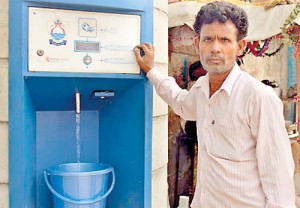Sunday Times 2
‘Water ATMs’ deliver liquid assets in India’s capital
Two years ago, Anand Shah, founder of Indian firm Sarvajal, wrote in our op-ed pages about how the company had developed solar-powered ‘water ATMs’ to get clean and affordable water to people in remote parts of India. Shah ended by sharing his vision to have a water vending machine in every village and on every city corner, as a simple solution to a lack of drinking water in the developing world.

People can bring their own bottles to fill with water, which costs 20 paise per litre, or a fifth of a rupee. To buy bottled water of this quality would cost at least 15 rupees
By last November Sarvajal had convinced the Delhi authorities to collaborate in a pilot project, and 24 ATMs are now in place across the city. SciDev.Net visited one of the five ATM machines in Dwarka Sector 3 Resettlement Colony – an unplanned neighbourhood without any public services – to find out how the company is expanding its urban presence.
Operations manager Amit Mishra explained how the company’s work is evolving. In rural parts of India, where internet connectivity is intermittent, Sarvajal generally sells the filtering system to entrepreneurs who then sell the water through 20-litre ATMs. But in Delhi, Sarvajal manages both the filtering process and the supply to ATMs that each hold 500 litres of water. “Here we are doing the partnership with the government,” says Mishra. “Clients are directly connected to us in urban areas. In rural areas, the clients are connected to the entrepreneur.”
To set up operations in the city, the government has permitted Sarvajal to use public land rent free for ten years, and to draw the water at each location. I ask Mishra if it was difficult to convince the authorities to get on board with the project. “Initially yes,” he says. “That’s why we have a pilot project for two years.” The government wanted to check whether this model was going to be financially viable for it or not, he explains, and how people would react to the idea of paying for water.
In parts of the city like this colony public services struggle to keep up with rapid urbanisation. “There is no proper piped infrastructure,” he says. “That’s why we have been invited to at least provide potable water. We are being given permission to operate our plants wherever there is no fixed pipeline framework available. We are doing that job and we are filling the gap.”
Sarvajal is part of the philanthropic foundation set up by the Indian multinational company Piramal Group.
Courtesy scidev.net

